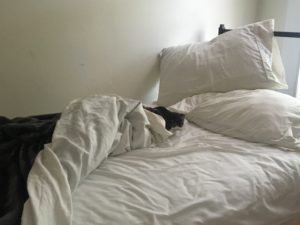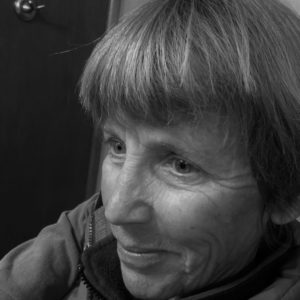 My friend—I’ll call her P—came here from a warmer continent and has no winter clothes. When I first met her a week before school began, she had no place to live, no one here previously known to her and no work. She had no bed, no dresser, no towels, sheets, blankets or pillows. We shared a pot of tea and a sandwich that day in my kitchen while she told me of her dreams to first become a lawyer, then the president of her small African country.
My friend—I’ll call her P—came here from a warmer continent and has no winter clothes. When I first met her a week before school began, she had no place to live, no one here previously known to her and no work. She had no bed, no dresser, no towels, sheets, blankets or pillows. We shared a pot of tea and a sandwich that day in my kitchen while she told me of her dreams to first become a lawyer, then the president of her small African country.
Our earliest adventure together was to find her a desk. With a desk, she said, she could study, and studying would bring her closer to her dreams. She has roommates now and a mattress on the floor. The other day I brought them a sofa and noticed the desk is also being used as a dining room table. For every household item I donate to the cause, P and her roommates are remarkably grateful. For them, America is truly a cornucopia of earthly delights and necessities. If they need a set of plates and glasses, a few days later I bring them by. When P needs a dresser, I find one for her. I tell her this is the overflow of a consumer society, the perks of global inequity delivered right to her door. My friends and I have garages full of stuff and when the call goes out we’re able to respond. We could take our excess to Goodwill or the Salvation Army or a number of other charitable organizations that specialize in “rehoming,” but somehow we don’t get around to it. As anyone with a pickup truck knows, when you pull up to a friend’s storage unit to permanently borrow a chair, you’ll likely go away with a full load.
The whole idea of a storage unit boggles P’s mind. “Do people sleep in there?” she wonders. “Do they live in there?” A good question, as they often contain more than one bed and dresser and some throw rugs for the floor. And yes, people do live in them, as we know, which brings me back to inequity, this time of a local nature. How is it that here in Flagstaff some of our fellow citizens have never discovered the cornucopia, the horn of abundance that offers them a comfortable place to rest, a comfortable life? P has shown me a sobering thing about the rich country in which I live: While we have the means and mindset to share our wealth, we often don’t. We speak a good line. Or to make it personal, because that is perhaps the key to systemic change: I speak a good line. Poverty is what we expect in certain places, and in those places we spend too little time envisioning or enabling sufficiency.
My friend P wants to be the president of her country, therefore it was hard for me to imagine her without a bed. If we know that everyone in every neighborhood wants a good mattress and a good education and enough food, why don’t we find a way to make that happen in a consistent, systemic and dedicated way?
I’ve just come from a trip to the Shetland Islands, or Shetland as it’s referred to by Shetlanders. Empty landscapes, a few brave sheep, wide watery skies and the most extraordinarily kind, humorous, intelligent and comfortable-in-their-skin people I’ve ever met. Even in the most remote of Shetland’s many islands, strangers in passing cars waved at me. They asked well-considered questions about my country, showing a deep understanding of how things work in the world beyond Shetland. While politically part of Scotland, Shetlanders are, in their ways of thinking and Viking heritage, closer to Norway. And yet they are first and foremost Shetlanders. Fishing has made them rich, as has North Sea oil. They spend their riches on bigger and better fishing boats and investing in the health of their communities. Almost every hamlet of more than a few dozen houses has a school and a Leisure Center. Inside every school the ratio of teachers to students is one to six. Inside every Leisure Center there’s a basketball court, a squash court, a crafts room and, to my delight, a good-sized swimming pool.
It’s a good idea to teach your fishermen how to swim, but it’s a great idea to plow your wealth back into the soil of your community. Which has me thinking: What do we here in Flagstaff consider our community? Is our scope too small? Does one neighborhood touch shoulders with the next, or, without really knowing it, do we compartmentalize, thanking our lucky stars we don’t live there where the schools aren’t as good and the homes turn a more ragged face to the world? Does our community extend only as far as the walls of our house? Do we know who lives around the corner or at the end of the block? Do we consider how similar are our wants and needs, and how good fortune is something with weight and heft and can be shared?
When I first came across my friend P she was looking for a place to rent across the street from where I live. After we ate together and drank tea, a ritual that finds its way all over the globe, I’ll admit I was hopeful she would become my neighbor. Sure I liked her, but along with that came the understanding that her life would enrich mine. Africa! A young woman interested in reaching beyond the confines of gender and becoming a lawyer and perhaps a president. An articulate student without a bed or desk who made the long journey here in order to change her corner of the world—in order to expand her neighborhood. A kind of Viking, she was, minus the violent means to an end. She had an aspiration that in a different time and place might have landed her on the shores of Shetland.
In the end she chose to rent elsewhere, and because she lives there that is my neighborhood, too. I brought her a warm jacket the other day, and she and her housemates made me dinner. As we ate together I realized we’d gone beyond the relationship of giver and receiver, into the quieter territory of mutuality. The thought came to me: To be truly sufficient we must be fully interdependent. That was an unexpected thought.

